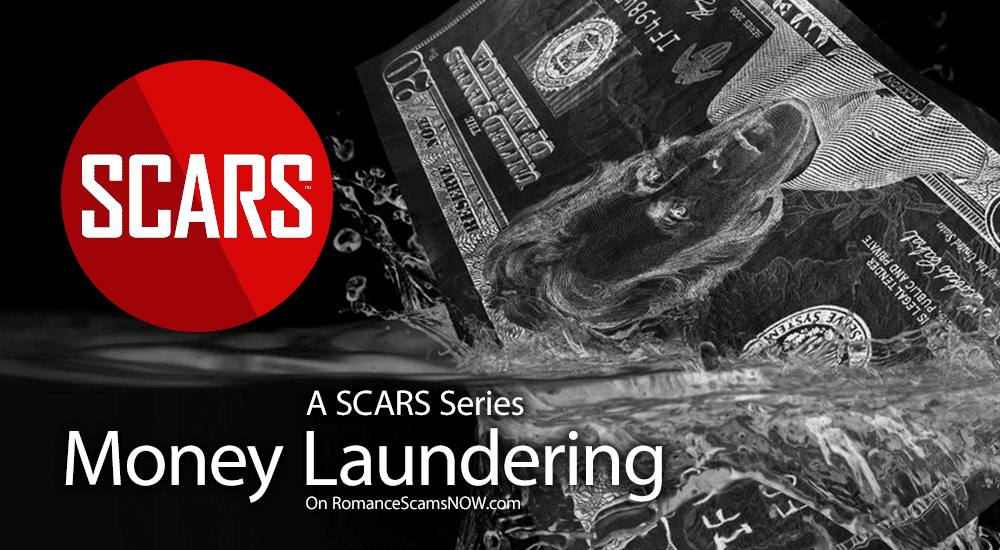
SCARS Institute’s Encyclopedia of Scams™ Published Continuously for 25 Years

‘Smurfing’ – Scammers & Criminals Use Many Different Money Mule Strategies To Launder Money In The Most Effective Way!
Smurfing, also known as structuring, is a money laundering technique that involves breaking up large amounts of cash into smaller, less noticeable amounts. This is done in order to avoid detection by law enforcement and financial institutions.
Smurfing
The term “smurfing” is thought to have originated from the popular Smurfs cartoon franchise, where the characters are small, blue creatures who live in harmony with nature. The similarity between the way the Smurfs divide up tasks and the way that money is laundered using smurfing is evident.
To smurf money, criminals will often use multiple people, known as “smurfs,” to deposit the cash into different bank accounts. Each deposit will be below a certain threshold, such as $10,000, which is the amount that triggers reporting requirements for financial institutions. This makes it more difficult for law enforcement to track the movement of the money.
Smurfing is a common money laundering technique and is used by criminals of all levels. It is a relatively simple technique to execute, but it can be effective in obscuring the source of the money.
Here are some examples of surfing:
- Scammers use many different money mules to transfer small amounts through their accounts that are below the trigger amounts for anit-money laundering controls.
- A drug dealer might break up $100,000 in cash into $10,000 increments and have 10 different people deposit the money into their bank accounts.
- A corrupt politician might have a friend deposit $10,000 in cash into their bank account every month to avoid suspicion.
- A terrorist organization might use smurfing to move money around the world to fund their activities.
Money Mules & Smurfing
Money mules are people who are recruited by criminals to help them launder money. They are often unaware of the illegal activities that are involved, and they are sometimes promised a fee for their services, in other cases, such as with romance scams they are not paid a fee but do it to help their new online partner.
Smurfing techniques and money mules are often used together to launder money. The criminals will use the money mules to deposit the cash into different bank accounts, each of which is below the reporting threshold. This makes it more difficult for law enforcement to track the movement of the money.
The criminals may also use the money mules to make online payments or to purchase assets, such as cars or houses. This helps to further disguise the source of the money.
Anti-money laundering (AML) controls are designed to prevent criminals from laundering money. However, smurfing and money mules can be used to bypass these controls. This is because the transactions are often small and do not trigger any red flags.
In order to combat smurfing and money mule activity, financial institutions need to be vigilant and to report suspicious activity to law enforcement even if below the required thresholds. They should be looking at account behaviors for any deviations that might hint at money laundering. They should also implement customer due diligence (CDD) procedures to verify the identity of their customers (KYC – Know Your Customers) and to understand their source of funds.
Individuals can also help to combat smurfing and money mule activity by being aware of the signs of suspicious activity and by reporting it to law enforcement.
Here are some of the signs of smurfing and money mule activity:
- Frequent cash deposits into bank accounts or frequent small instant payments or transfers
- Small, frequent transactions
- Transactions made by people who do not know each other
- Transactions made in different countries
- Transactions that are made using shell companies or other anonymous entities
Reporting Smurfing
If you suspect that you or someone else is being used to smurf, you should report it to law enforcement. You can do this by contacting your local police department or the FBI.
When you report the suspected smurfing activity, you should be prepared to provide as much information as possible. This includes the following:
- The name and contact information of the person who is suspected of smurfing
- The amount of money that is being smurfed
- The dates and times of the transactions
- The bank accounts that are being used
- Any other information that you think may be relevant
You should also explain to the law enforcement officer why you suspect that smurfing is taking place. This could include things like:
- The person who is suspected of smurfing is involved in illegal activities
- The person has asked you to deposit large amounts of cash into their bank account
- The person has asked you to make wire transfers to other countries
It is important to remember that you are not obligated to help the law enforcement officer with their investigation – if this involves your account, we suggest cooperating to make it clear that you are an innocent party in this. However, if you do choose to help, you should be honest and truthful. The more information you can provide, the better the chances of the law enforcement officer being able to understand and stop the smurfing activity.
Here are some tips for explaining the suspected smurfing activity to law enforcement:
- Be clear and concise.
- Use simple language that the law enforcement officer can understand.
- Be specific about the details of the suspected smurfing activity – transaction details – the chats & dialog don’t matetr.
- Be prepared to answer questions about the suspected smurfing activity.
- Be honest and truthful.
- Never try to hide anything!
If you are concerned about your safety, you can ask to speak to a lawyer before you talk to law enforcement. You can also ask to have the conversation recorded.
Smurfing is a serious crime and can result in imprisonment. If you suspect that someone is smurfing money, you should report it to law enforcement. To learn more about reporting these crimes go to reporting.AgainstScams.org
More:
- Cryptocurrency Money Laundering – Cybercrime/Scam Basics (romancescamsnow.com)
- The Vancouver Model of Money Laundering (romancescamsnow.com)
- Money Laundering Through Video Games (romancescamsnow.com)
- Money Mules & Money Laundering – An Introduction (romancescamsnow.com)
- Money Laundering Presents Grave Dangers For Scam Victims & Mules (romancescamsnow.com)
- Money Mules – Article Catalog (romancescamsnow.com)
-/ 30 /-
What do you think about this?
Please share your thoughts in a comment below!
LEAVE A COMMENT?
Recent Comments
On Other Articles
- Arwyn Lautenschlager on Love Bombing And How Romance Scam Victims Are Forced To Feel: “I was love bombed to the point that I would do just about anything for the scammer(s). I was told…” Feb 11, 14:24
- on Dani Daniels (Kira Lee Orsag): Another Scammer’s Favorite: “You provide a valuable service! I wish more people knew about it!” Feb 10, 15:05
- on Danielle Delaunay/Danielle Genevieve – Stolen Identity/Stolen Photos – Impersonation Victim UPDATED 2024: “We highly recommend that you simply turn away form the scam and scammers, and focus on the development of a…” Feb 4, 19:47
- on The Art Of Deception: The Fundamental Principals Of Successful Deceptions – 2024: “I experienced many of the deceptive tactics that romance scammers use. I was told various stories of hardship and why…” Feb 4, 15:27
- on Danielle Delaunay/Danielle Genevieve – Stolen Identity/Stolen Photos – Impersonation Victim UPDATED 2024: “Yes, I’m in that exact situation also. “Danielle” has seriously scammed me for 3 years now. “She” (he) doesn’t know…” Feb 4, 14:58
- on An Essay on Justice and Money Recovery – 2026: “you are so right I accidentally clicked on online justice I signed an agreement for 12k upfront but cd only…” Feb 3, 08:16
- on The SCARS Institute Top 50 Celebrity Impersonation Scams – 2025: “Quora has had visits from scammers pretending to be Keanu Reeves and Paul McCartney in 2025 and 2026.” Jan 27, 17:45
- on Scam Victims Should Limit Their Exposure To Scam News & Scammer Photos: “I used to look at scammers photos all the time; however, I don’t feel the need to do it anymore.…” Jan 26, 23:19
- on After A Scam, No One Can Tell You How You Will React: “This article was very informative, my scams happened 5 years ago; however, l do remember several of those emotions and/or…” Jan 23, 17:17
- on Situational Awareness and How Trauma Makes Scam Victims Less Safe – 2024: “I need to be more observant and I am practicing situational awareness. I’m saving this article to remind me of…” Jan 21, 22:55
ARTICLE META
Important Information for New Scam Victims
- Please visit www.ScamVictimsSupport.org – a SCARS Website for New Scam Victims & Sextortion Victims
- Enroll in FREE SCARS Scam Survivor’s School now at www.SCARSeducation.org
- Please visit www.ScamPsychology.org – to more fully understand the psychological concepts involved in scams and scam victim recovery
If you are looking for local trauma counselors please visit counseling.AgainstScams.org or join SCARS for our counseling/therapy benefit: membership.AgainstScams.org
If you need to speak with someone now, you can dial 988 or find phone numbers for crisis hotlines all around the world here: www.opencounseling.com/suicide-hotlines
A Note About Labeling!
We often use the term ‘scam victim’ in our articles, but this is a convenience to help those searching for information in search engines like Google. It is just a convenience and has no deeper meaning. If you have come through such an experience, YOU are a Survivor! It was not your fault. You are not alone! Axios!
A Question of Trust
At the SCARS Institute, we invite you to do your own research on the topics we speak about and publish, Our team investigates the subject being discussed, especially when it comes to understanding the scam victims-survivors experience. You can do Google searches but in many cases, you will have to wade through scientific papers and studies. However, remember that biases and perspectives matter and influence the outcome. Regardless, we encourage you to explore these topics as thoroughly as you can for your own awareness.
Statement About Victim Blaming
SCARS Institute articles examine different aspects of the scam victim experience, as well as those who may have been secondary victims. This work focuses on understanding victimization through the science of victimology, including common psychological and behavioral responses. The purpose is to help victims and survivors understand why these crimes occurred, reduce shame and self-blame, strengthen recovery programs and victim opportunities, and lower the risk of future victimization.
At times, these discussions may sound uncomfortable, overwhelming, or may be mistaken for blame. They are not. Scam victims are never blamed. Our goal is to explain the mechanisms of deception and the human responses that scammers exploit, and the processes that occur after the scam ends, so victims can better understand what happened to them and why it felt convincing at the time, and what the path looks like going forward.
Articles that address the psychology, neurology, physiology, and other characteristics of scams and the victim experience recognize that all people share cognitive and emotional traits that can be manipulated under the right conditions. These characteristics are not flaws. They are normal human functions that criminals deliberately exploit. Victims typically have little awareness of these mechanisms while a scam is unfolding and a very limited ability to control them. Awareness often comes only after the harm has occurred.
By explaining these processes, these articles help victims make sense of their experiences, understand common post-scam reactions, and identify ways to protect themselves moving forward. This knowledge supports recovery by replacing confusion and self-blame with clarity, context, and self-compassion.
Additional educational material on these topics is available at ScamPsychology.org – ScamsNOW.com and other SCARS Institute websites.
Psychology Disclaimer:
All articles about psychology and the human brain on this website are for information & education only
The information provided in this article is intended for educational and self-help purposes only and should not be construed as a substitute for professional therapy or counseling.
While any self-help techniques outlined herein may be beneficial for scam victims seeking to recover from their experience and move towards recovery, it is important to consult with a qualified mental health professional before initiating any course of action. Each individual’s experience and needs are unique, and what works for one person may not be suitable for another.
Additionally, any approach may not be appropriate for individuals with certain pre-existing mental health conditions or trauma histories. It is advisable to seek guidance from a licensed therapist or counselor who can provide personalized support, guidance, and treatment tailored to your specific needs.
If you are experiencing significant distress or emotional difficulties related to a scam or other traumatic event, please consult your doctor or mental health provider for appropriate care and support.
Also read our SCARS Institute Statement about Professional Care for Scam Victims – click here to go to our ScamsNOW.com website.
















Thank you for your comment. You may receive an email to follow up. We never share your data with marketers.